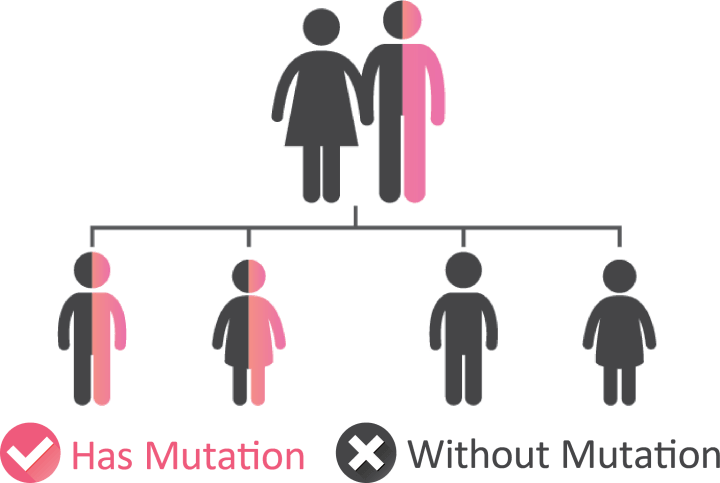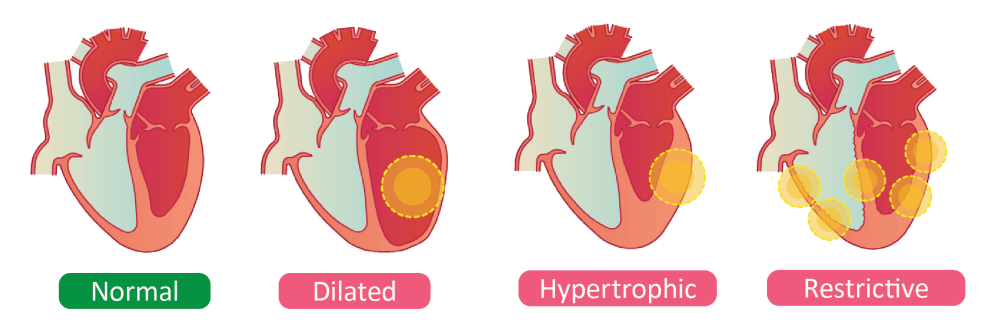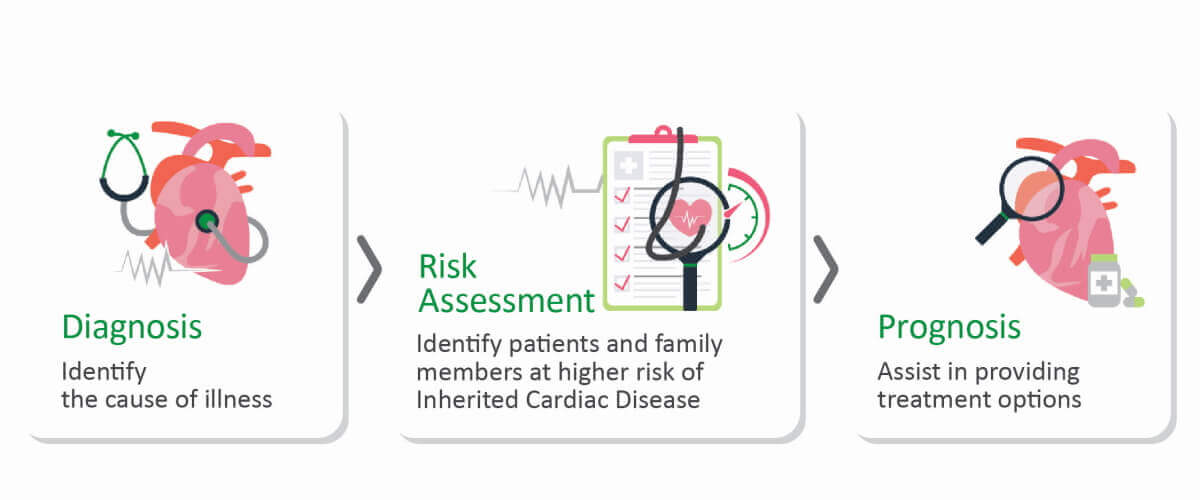What are Inherited Cardiac Disease?
"Cardiac Diseases" is a collective term of diseases related to the heart, and many of them are inherited. Below are some common inherited cardiac diseases:
| Arrhythmia | |
| Cardiomyopathy | |
| Lipidemia | |
| Aortopathy | |
| Cardiac Diseases can be asymptomatic and lethal |
One Person dies every minute due to Heart Disease#^
| Every Year 54.4M People Die from Sudden Cardiac Death(SCD) in Mainland China ^ | |
| 30% SCD Patients have a SADS gene mutation* | |
| The Risk of Heart Attack increase for those who have Familial Hypercholesterolemia* |
Onset of Cardiac Disease
| Heart Disease is the No. 2 Killer in Hong Kong | |
| An Average of 5000 people have died from heart diseases | |
| There is a significant increase of 10% in Coronary Heart Disease Incidences between 15-24 year-olds people |
Heart conditions that can lead to sudden cardiac arrest
How common is sudden cardiac death in Hong Kong?
| Over 4,000 people die related to coronary heart disease every year. The death rate is higher than some common cancers. | |
| A cardiac specialist pointed out that more than 50% of patients do not have any symptoms before onset. | |
| And the patient will die without CPR in the golden period. | |
| The death rate is 30% in sudden cardiac death, and 60% of the patients died within 1 hour2. |
Which conditions related to sudden cardiac arrest?
Sudden cardiac arrest can happen in people who have no known heart disease. However, a life-threatening arrhythmia usually develops in a person with a preexisting, possibly undiagnosed heart condition. Conditions include3:
| Below the conditions are listed related to sudden cardiac arrest | |||
| These genes are covered in MYGENIA® Inherited Cardiac Disease Genetic Screening | |||
|
|||
|
|||
|
|||
|
There is a 50% chance of passing the disease to the Next Generation

Disease information related to heart diseases
American College of Cardiology [ACC], American Heart Association [AHA], Heart Rhythm Society and Heart Failure Society of America recommend genetic testing as a clinical diagnosis tool for the most commonly heart diseases as seen below:
| Disease types | Condition | Prevalence | Genetic testing for Patients with established or suspected clinical diagnosis |
Genetic testing of Family Members |
|---|---|---|---|---|
| Cardiomyopathies | Hypertrophic Cardiomyopathy | 1 : 200-500 | Recommended | Recommended |
| Dilated Cardiomyopathy | 1 : 250-500 | Recommended | Recommended | |
| Arrhythmogenic Cardiomyopathy | 1 : 5,000 | Recommended | Recommended | |
| Arrhythmias | Long QT Syndrome | 1 : 2,500 | Recommended | Recommended |
| Catecholaminergic Polymorphic Ventricular Tachycardia | 1 : 10,000 | Recommended | Recommended | |
| Brugada Syndrome | 1 : 5,000-10,000 | Recommended | Recommended | |
| Aortopathies | Marfan Syndrome | 1 : 5,000 | Recommended | Recommended |
| Loeys-Dietz Syndrome | 1 : 100,000 | Recommended | Recommended | |
| Familial Thoracic Aortic Aneurysms and Dissections | 1 : 100,000 | Recommended | Recommended | |
| Vascular Ehlers-Danlos Syndrome | 1 : 50,000-200,000 | Recommended | Recommended | |
| Lipidemias | Familial Hypercholesterolemia | 1:220 | Recommended | Recommended |

New Screening Technology
| Technology of the Test | Next-generation sequencing (NGS) | ||||||
|---|---|---|---|---|---|---|---|
| Test Name | MYGENIA® Inherited Cardiac Disease Genetic Screening | ||||||
| Advantages |
|
||||||
| Diagnosis Advantages |
|
Traditional Cardiac Technology Comparison
| Technology of the Test | Electrocardiography (ECG) | Imaging Recognition | |||||||||||||||
|---|---|---|---|---|---|---|---|---|---|---|---|---|---|---|---|---|---|
| Test Name |
Treadmill Exercise Test Resting Electrocardiogram |
Ultrasound | X-ray | Magnetic resonance imaging (MRI) |
Computed Tomography (CT scan) |
||||||||||||
| Advantages |
|
|
|
|
|
||||||||||||
| Disadvantages |
|
|
|
|
|
||||||||||||
MYGENIA® Inherited Cardiac Disease Genetic Screening (RAC)
Covers 255 Genes associated with Inherited Cardiac Diseases
| Every 1 out of 200-500 Asians is a Carrier of Inherited Cardiac Diseases | |
| The risk of heart attack increases 22 times for those who have a history of Familial Hypercholesterolemia | |
| Accuracy of Next Generation Sequencing Technology is up to 99.9% | |
| Sensitivity of the Test is over 99% | |
| Professional report interpreted by a genetic counsellor |
Who is suitable for this test
| Have Familial Heart Disease History (High Risk Group) | |
| Experiences with muscle pain in the chest (may be related with Heart) | |
| Worrying whether you have genetic mutations related to Heart Diseases | |
| Unhealthy lifestyle: Smoking, alcoholism, or unhealthy eating habits | |
| Overweight, lack of exercise | |
| Have high blood pressure and/or diabetes | |
| Anyone eager to know about their health |
Test Specifications
| Test Code | Methodology | Specimen Requirements | Turnaround Time |
|---|---|---|---|
| RAC | NGS (Next Generation Sequencing) | 6ml blood in Lavender-top EDTA tube | 4-6 Weeks |
Reference
- * SADSHK Foundation
- ^ Report on Cardiovascular Health and Diseases in China 2019
- # Topick: Research Report from Cardiologist Dr. CHAN Leung Kwai
- 1 MAYOCLINIC - Sudden death in young people: Heart problems often blamed
- 2 Care For Your Heart
- 3 MAYOCLINIC- Sudden cardiac arrest



